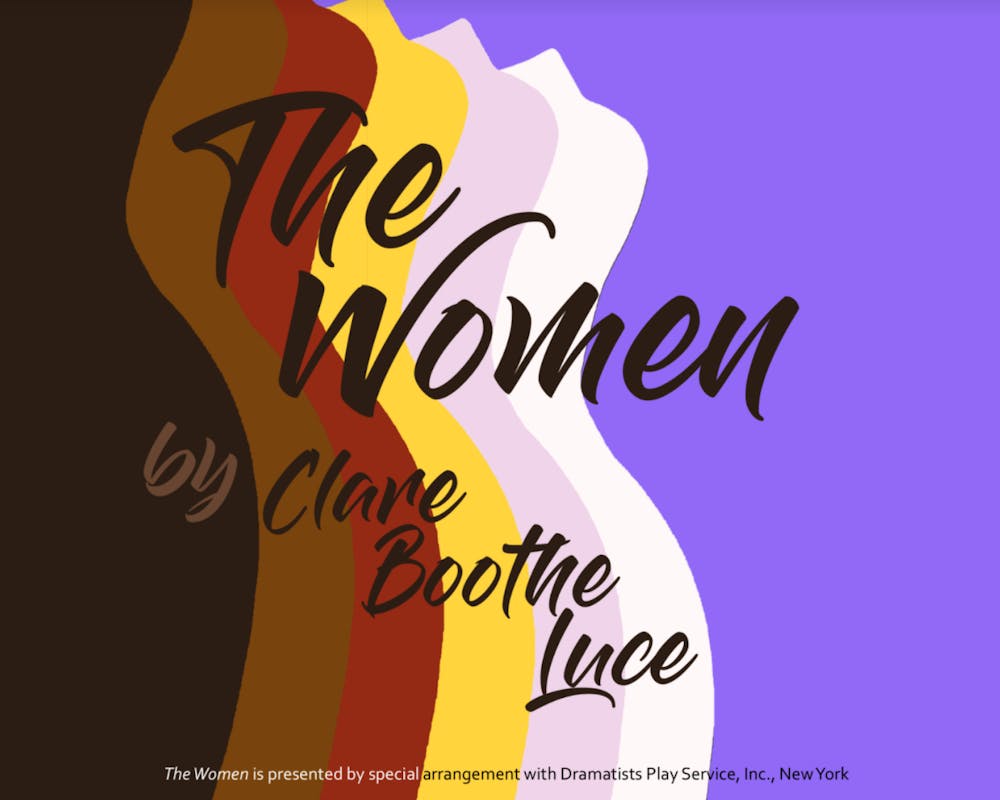“There is solace in satire, especially when the object of scorn is the upper classes,” wrote director and American University professor Karl Kippola in his director’s note.
His comment is timely — 2020 continues to wrack nerves, cause tumult and breed resentment toward classist injustice. AU’s weekend production of “The Women” satirizes the dramas of 1930s upper-class women, but it’s also a reminder that we have the agency (and more importantly, the responsibility) to realize our own “happily ever after.”
Author and politician Clare Boothe Luce wrote “The Women” in 1936 during the Great Depression. The growing conservatism and widening wealth gap was a prelude to 2020.
After her husband has an affair, Mary Haines, the idealistic protagonist played by AU senior Edmée Marie Faal, finds herself amid the clamor and gossip of high society women. The play follows Mary’s tumultuous journey as she navigates the well-intentioned, jaded advice of her friends, while staying true to her unyielding, doe-eyed optimism.
Mary straddles the contradictions facing 1930s women. “He’s taking the trouble to deceive you, and that means he must have really cared,” Mary says to console a friend after the friend’s husband also had an affair.
Marriage is utilitarian (“If children ain’t the point of marriage, what is?” Jane, the maid, says), and yet Mary romanticizes it. Mary straddles these juxtapositions to make sense of herself within a strict, limited cultural framework and attain self-fulfillment.
Women in the United States do this every day. They respond to increasing cultural pressures and restrictive legislation by digging deeper into themselves, defining their core beliefs and finding support in their communities. Mary’s traditionalism and commitment to being a wife and mother may frustrate liberal audience members, but that choice remains hers alone.
“In getting to know Mary,” Faal said. “Though I don’t agree with all her choices, I empathize with her agency to make those choices.”
Faal brilliantly portrays Mary trapped between two impossibilities: the fairy tale she wants and the impossible cultural expectations placed upon a woman scorned. The challenge lies in transcending what we are led to believe and what we hold to be true, like Mary does.
It’s extraordinary this production happened at all. Kippola and his team mailed costumes, props and computer parts to 18 cast members worldwide, from rural Vermont to Switzerland. Though the cast spans the globe, the performance felt like it took place in one digital home — this weird, amorphous virtual space where we now spend a big part of our lives.
“The Women” transcended the typical criticisms of the assumed incompatibility between Zoom and theatre. Fight scenes, splendidly choreographed by AU’s fight choreographer in residence Robb Hunter, spanned multiple video squares. I laughed at the Countess de Lage’s wild extravagance, played by AU sophomore Alexandra Plummer. At one point, the Countess collapsed after a fight and hurdled into the corner of a white sheet, which was acting as a Zoom background.
The gaffe made me laugh, adding only to the scene’s chaos and reminding me of the sheer impossibility that this production happened at all.
“I think Zoom (or something like it) does have a place in the future — but likely (and hopefully) in ways we have not yet imagined,” Kippola wrote in an email to The Eagle. “The melding of theatre and technology is necessary — it always has been — and this moment has forced theatre artists to speed up the process of drawing seemingly disparate elements together.”
We are not removed from the world of “The Women.” The play’s cynicism toward love, romance, possibility and idealism reminds me of the snarky pessimism of youth meme culture.
AU’s production of “The Women” gives me hope. For three hours, I watched actresses do what they loved despite the circumstances. Unlike block classes on Zoom, the time went quickly.
The cast and crew lived out the play’s message as best they could: in trying times, they fought for their happily ever after, and that brand of resilient enthusiasm is infectious.





